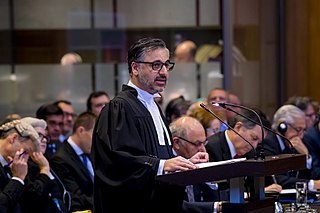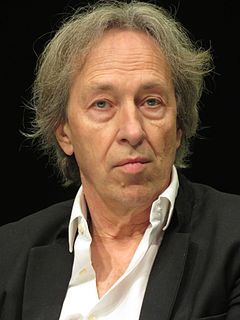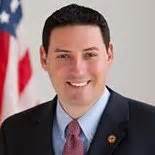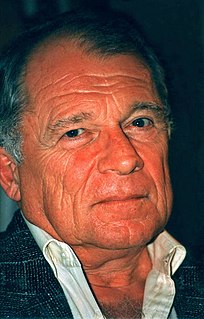A Quote by Payam Akhavan
Criminal trials are fundamentally about individual accountability whereas truth commissions are less about the guilt of the perpetrator and more about the suffering of the victim. A criminal trial is only incidentally a therapeutic or cathartic process for victims. But truth commissions, as we saw in South Africa, have the advantage of giving tens of thousands of people the opportunity to tell their stories, and not only does that contribute to healing but it also contributes to reconciliation, especially when perpetrators also come and express contrition.
Quote Topics
About
Accountability
Advantage
Africa
Also
Cathartic
Come
Contribute
Contrition
Does
Express
Fundamentally
Giving
Guilt
Healing
Individual
Less
More
Only
Opportunity
People
Perpetrator
Perpetrators
Process
Reconciliation
Saw
South
South Africa
Stories
Suffering
Tell
Tens
Tens Of Thousands
Therapeutic
Thousands
Thousands Of People
Trial
Trials
Truth
Victim
Victims
Whereas
Related Quotes
In the '90s, we are all our own gurus, offering truth to each other. My message is that we all have a truth inside of us that we must tell. The synchronicity of life is all about becoming clear, knowing what that truth is, watching and taking advantage of the opportunity to express that truth, and knowing how to present it.
The Bible is a wonderful book. It is the truth about the Truth. It is not the Truth. A sermon taken from the Bible can be a wonderful thing to hear. It is the truth about the truth about the truth. But it is not the truth. There have been many books written about the things contained in the Bible. I have written some myself. They can be quite wonderful to read. They are the truth about the truth about truth about the Truth. But they are NOT the Truth. Only Jesus Christ is the Truth. Sometimes the Truth can be drowned in a multitude of words.
In representing criminal defendants - especially guilty ones - it is often necessary to take the offensive against the government: to put the government on trial for its misconduct. In law, as in sports, the best defense is often a good offense. The courtroom oath - to tell the truth, the whole truth and nothing but the truth - is applicable only to witnesses... because the American justice system is built on a foundation of not telling the whole entire truth.
Forgiving and being reconciled to our enemies or our loved ones are not about pretending that things are other than they are. It is not about patting one another on the back and turning a blind eye to the wrong. True reconciliation exposes the awfulness, the abuse, the hurt, the truth. It could even sometimes make things worse. It is a risky undertaking but in the end it is worthwhile, because in the end only an honest confrontation with reality can bring real healing. Superficial reconciliation can bring only superficial healing.
In existing criminology there are concepts: a criminal man, a criminal profession, a criminal society, a criminal sect, and a criminal tribe, but there is no concept of a criminal state, or a criminal government, or criminal legislation. Consequently what is often regarded as "political" activity is in fact a criminal activity.
AS SOMBRAS DA ALMA. THE SHADOWS OF THE SOUL. The stories others tell about you and the stories you tell about yourself: which come closer to the truth? Is it so clear that they are your own? Is one an authority on oneself? But that isn't the question that concerns me. The real question is: In such stories, is there really a difference between true and false? In stories about the outside, surely. But when we set out to understand someone on the inside? Is that a trip that ever comes to an end? Is the soul a place of facts? Or are the alleged facts only the deceptive shadows of our stories?
I've seen lots of murders, no murder is ever nice, and I just don't think the victim's family has an opportunity to get all the justice they might want. We seem to always forget about victim's families and we focus in on the criminal and we need to get away from that and focus on the people that are actually suffering because of the incident. They can lobby their elected State's Attorney to have the death penalty on the table.
Start telling the truth now and never stop. Begin by telling the truth to yourself about yourself. Then tell the truth to yourself about someone else. Then tell the truth about yourself to another. Then tell the truth about another to that other. Finally, tell the truth to everyone about everything. These are the Five Levels Of Truth Telling. This is the five-fold path to freedom.
Five Truths
about
Fear Truth
1. The fear
will never
go away as
long as I continue
to grow. Truth 2. The only way to get rid of the fear of doing something is to go out and do it. Truth 3. The only way to feel better about myself is to go out… and do it. Truth 4. Not only am I going to experience fear whenever I’m on unfamiliar territory, but so is everyone else. Truth 5. Pushing through fear is less frightening than living with the underlying fear that comes from a feeling of helplessness.
For a lawyer to do less than his utmost is, I strongly feel, a betrayal of his client. Though in criminal trials one tends to focus on the defense attorney and his client the accused, the prosecutor is also a lawyer, and he too has a client: the People. And the People are equally entitled to their day in court, to a fair and impartial trial, and to justice.
































